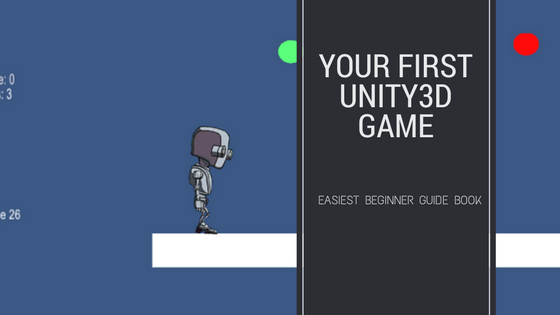Getting through your first unity3d game – best beginner book guide

For most people interested in 3d or 2d game development, it’s always easy to settle for Unity3d because of how flexible and versatile it is for both cases. But one of the first things they notice is how easy it is to get overwhelmed with all the things that must be learnt, from choosing a programming language (C# or JavaScript), learning Unity3d’s Interface and API and also figuring out the hundreds of tools and assets from Unity Asset Store. It is even worse when they do not have a programming background.
Most common beginners’ problems with learning Unity3d
Over a long time, it’s easy to learn how to execute different tricks, probably also learn the fundamentals like creating scripts and prefabs, rigid body and collision boxes and some programming, but now, how to fit all these together to make a simple game becomes the new problem.
During the period I started learning Unity and C# in between working on my day job, I went through a lot of books and Youtube videos that taught making games in Unity and I learnt a decent lot, but I often almost forgot immediately, and I couldn’t really put anything decent together. I could create little scripts to move my characters, both 3d and 2d, collect objects, create collision boxes and set up little scenes, and maybe some independent menu with the UI system but I couldn’t link all these together to make anything worthwhile.
Here are the things I believe you need to know to be able to put a simple 2d game together;
- How to set up your main menu; Play buttons to initiate game play, instruction button and other UI elements.
- How to set up your scenes, characters, prefabs and scripts.
- How to trigger game over and other events like restarting, dying.
- How to create props like platforms and moving platforms, traps and mini-maps.
- Linking all together to make a standalone PC game (It doesn’t cover how to port to mobile devices but that is easy to learn).
The first book that led the way in this direction was, “A Beginner's Guide to 2D Platform Games with Unity: Create a Simple 2D Platform Game and Learn to Code in the Process” by Patrick Felicia.
It changed all the initial confusion and it actually holds your hand (for those who really need that). It took me through a simple 2d platformer, explaining all the different tools and tricks along the way. Note: you must have a little knowledge of Unity’s UI and maybe a little C# ( the preferred language).
Having been through a few books, I think it is about the best you can get from a single book and it was exciting all through. I sat through and completed it in about 3 days. Repeating it will make the learning more solid.
Take a look at my first 2d platformer with Unity3d, I plan to extend the game play (more platforms, enemies and traps, fix the bugs and add a decent background and probably put on google playstore some time later.
.png)
Also featured on digixdel.com
I often tinker with different programming languages/APIs/IDEs, and like you said there's always so much to learn. It's also hard to figure out which resources to use for help and to consolidate good information. Putting together a piecemeal of different tutorial series sometimes works, but and good book can be worth its weight in gold. It's good to have suggestions like this.
yeah, a good book could really be worth it and might be all you need to put all you've learnt over time in perspective. Imagine I was learning Unity in between day jobs for months (even on and off for years) and didnt go beyond learning a few things here and there but once I found the book, I was able to put a simple platformer together.